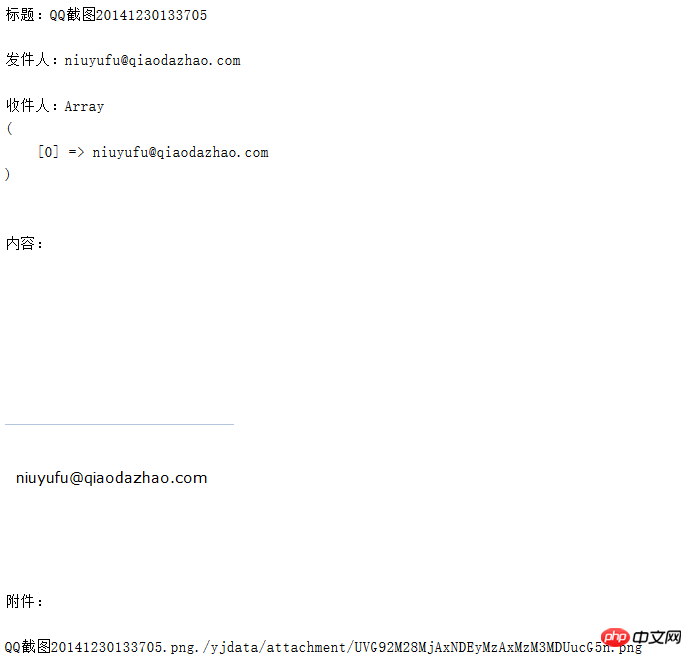Home >Backend Development >PHP Tutorial >Example sharing of how php reads and parses eml files and generates web pages
This article mainly introduces the method of PHP reading, parsing eml files and generating web pages. It analyzes related implementation techniques and precautions for reading, parsing and converting eml files by PHP in the form of examples, and comes with demo source code. For readers' download reference, friends in need can refer to
This article describes the method of reading, parsing eml files and generating web pages with PHP. Share it with everyone for your reference. The details are as follows:
php reads eml example. This example can parse the exported eml file into text and save the attachment to the server. Without further ado, I’ll just post the code.
<?php
// Author: richard e42083458@163.com
// gets parameters
error_reporting(E_ALL ^ (E_WARNING|E_NOTICE));
header("Content-type: text/html; charset=utf-8");
echo "<pre class="brush:php;toolbar:false">";
define(EML_FILE_PATH,'./yjdata/');
//if ($filename == '') $filename = '21724696_niuyufu@qiaodazhao.com_ZC4422-r7GMz_R9QF3K6XUhmJOXd4c.eml';
//if ($filename == '') $filename = '21724696_niuyufu@qiaodazhao.com_ZC3218-dGquMgm7ytdF6HQgpSReC4c.eml';
//if ($filename == '') $filename = '163.eml';
//if ($filename == '') $filename = '166.eml';
//if ($filename == '') $filename = 'nyf.eml';
//if ($filename == '') $filename = 'email_header_icon.eml';
if ($filename == '') $filename = '20141230133705.eml';
$eml_file = EML_FILE_PATH.$filename;
if (!($content = fread(fopen(EML_FILE_PATH.$filename, 'rb'), filesize(EML_FILE_PATH.$filename))))
die('File not found ('.EML_FILE_PATH.$filename.')');
//标题内容
$pattern="/Subject: (.*?)\n/ims";
preg_match($pattern,$content,$subject_results);
$subject = getdecodevalue($subject_results[1]);
echo "标题:".$subject;
//发件人:
$pattern="/From: .*?<(.*?)>/ims";
preg_match($pattern,$content,$from_results);
$from = $from_results[1];
echo "\n\r";
echo "发件人:".$from;
//收件人:
$pattern="/To:(.*?):/ims";
preg_match($pattern,$content,$to_results);
$pattern="/<(.*?)>/ims";
preg_match_all($pattern,$to_results[1],$to_results2);
if(count($to_results2[1])>0){
$to = $to_results2[1];
}else{
$pattern="/To:(.*?)\n/ims";
preg_match($pattern,$content,$to_results);
$to = $to_results[1];
}
echo "\n\r";
echo "收件人:";
print_r($to);
echo "\n\r";
//正文内容
$pattern = "/Content-Type: multipart\/alternative;.*?boundary=\"(.*?)\"/ims";
preg_match($pattern,$content,$results);
if($results[1]!=""){
$seperator = "--".$results[1];
}else{
die("boundary匹配失败");
}
$spcontent = explode($seperator, $content);
$items = array();
$keyid = 0;
$email_front_content_array = array();
foreach($spcontent as $spkey=>$item) {
//匹配header编码等信息
$pattern = "/Content-Type: ([^;]*?);.*?charset=(.*?)\nContent-Transfer-Encoding: (.*?)\n/ims";
preg_match($pattern,$item,$item_results);
if(count($item_results)==4){
$Content_code = str_replace($item_results[0],"",$item);
$item_results[4] = $Content_code;
if(trim($item_results[3])=="base64"){
$item_results[5] = base64_decode($item_results[4]);
}
if(trim($item_results[3])=="quoted-printable"){
$item_results[5] = quoted_printable_decode($item_results[4]);
}
$item_results[5] = mb_convert_encoding($item_results[5], 'UTF-8', trim($item_results[2]));
//echo $item_results[5];exit;
$email_front_content_array[] = $item_results;
}
}
foreach ($email_front_content_array as $email_front_content_each_key=>$email_front_content_each_value){
if($email_front_content_each_value[1]=='text/html'){
$content_html = $email_front_content_each_value[5];
break;
}else{
$content_html = $email_front_content_each_value[5];
}
}
echo "内容:";
echo "\n\r";
echo $content_html;
echo "\n\r";
//附件内容
$pattern = "/Content-Type: multipart\/mixed;.*?boundary=\"(.*?)\"/ims";
preg_match($pattern,$content,$results);
if($results[1]!=""){
$seperator = "--".$results[1];
$spcontent = explode($seperator, $content);
$items = array();
$keyid = 0;
$email_attachment_content_array = array();
foreach($spcontent as $spkey=>$item) {
//匹配header编码等信息
$pattern = "/Content-Type: ([^;]*?);.*?name=(.*?)\nContent-Transfer-Encoding: (.*?)\nContent-Disposition: attachment;.*?filename=(.*?)\n/ims";
preg_match($pattern,$item,$item_results);
//print_r($item_results);
if(count($item_results)==5){
$Content_code = str_replace($item_results[0],"",$item);
$item_results[5] = trim($Content_code);
if(trim($item_results[3])=="base64"){
$item_results[6] = base64_decode($item_results[5]);
}
if(trim($item_results[3])=="quoted-printable"){
$item_results[6] = quoted_printable_decode($item_results[5]);
}
$item_results[7] = str_replace("\"","",getdecodevalue($item_results[2]));
$item_results[8] = str_replace("\"","",getdecodevalue($item_results[4]));
//保存附件内容到服务器?
//符合规范的文件名时:有后缀名时。
if(strrpos($item_results[8], '.')!==false){
$ext = substr($item_results[8], strrpos($item_results[8], '.') + 1);
//$filename = "./yjdata/attachment/".date("YmdHis").mt_rand(10000,99999).".".trim($ext);
$attachment_filename = "./yjdata/attachment/".trim(str_replace("\"","",getbase64code($item_results[4]))).".".trim($ext);
mkdirs(dirname($attachment_filename));
$fp = fopen($attachment_filename, "w+");
if (flock($fp, LOCK_EX)) { // 进行排它型锁定
fwrite($fp, $item_results[6]);
flock($fp, LOCK_UN); // 释放锁定
} else {
//echo "Couldn't lock the file !";
}
fclose($fp);
$item_results[9] = $attachment_filename;
$email_attachment_content_array[] = $item_results;
}
}
}
//print_r($email_attachment_content_array);
}
if(count($email_attachment_content_array)>0){
echo "附件:";
echo "\n\r";
//附件读取
foreach($email_attachment_content_array as $email_attachment_content_each_key=>$email_attachment_content_each_value){
unset($email_attachment_content_each_value[5]);
unset($email_attachment_content_each_value[6]);
print_r($email_attachment_content_each_value[8]);
print_r($email_attachment_content_each_value[9]);
}
}
function getbase64code($content){
$pattern="/=\?GB2312\?B\?(.*?)\?=|=\?GBK\?B\?(.*?)\?=|=\?UTF-8\?B\?(.*?)\?=/ims";
preg_match($pattern,$content,$subject_results);
if($subject_results[1]!=""){
$subject = $subject_results[1];
$charset = "GB2312";
}
elseif($subject_results[2]!=""){
$subject = $subject_results[2];
$charset = "GBK";
}
elseif($subject_results[3]!=""){
$subject = $subject_results[3];
$charset = "UTF-8";
}else{
$subject = $content;
$charset = "";
}
return $subject;
}
function getdecodevalue($content){
$pattern="/=\?GB2312\?B\?(.*?)\?=|=\?GBK\?B\?(.*?)\?=|=\?UTF-8\?B\?(.*?)\?=/ims";
preg_match($pattern,$content,$subject_results);
if($subject_results[1]!=""){
$subject = base64_decode($subject_results[1]);
$charset = "GB2312";
}
elseif($subject_results[2]!=""){
$subject = base64_decode($subject_results[2]);
$charset = "GBK";
}
elseif($subject_results[3]!=""){
$subject = base64_decode($subject_results[3]);
$charset = "UTF-8";
}else{
$subject = $content;
$charset = "";
}
if($charset!=""){
$subject = mb_convert_encoding($subject, 'UTF-8', $charset);
}
return $subject;
}
function mkdirs($dir)
{
if(!is_dir($dir))
{
if(!mkdirs(dirname($dir))){
return false;
}
if(!mkdir($dir,0777)){
return false;
}
}
chmod($dir, 777); //给目录操作权限
return true;
}
?>There are pictures and the truth:

The above is the detailed content of Example sharing of how php reads and parses eml files and generates web pages. For more information, please follow other related articles on the PHP Chinese website!